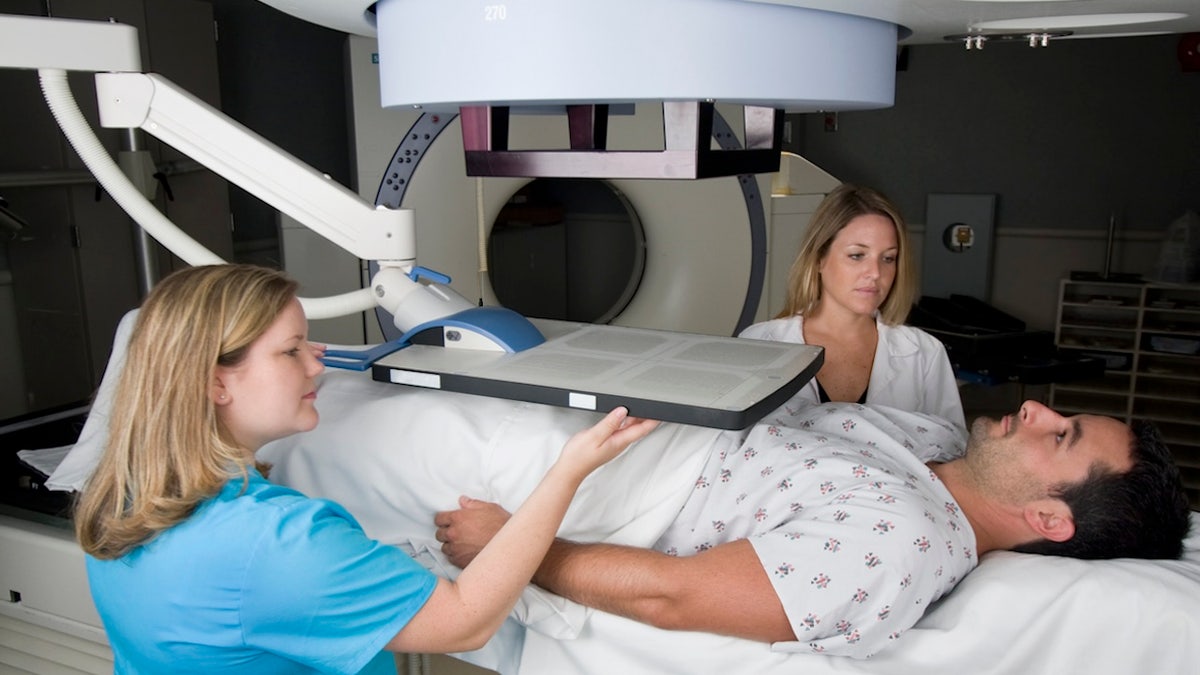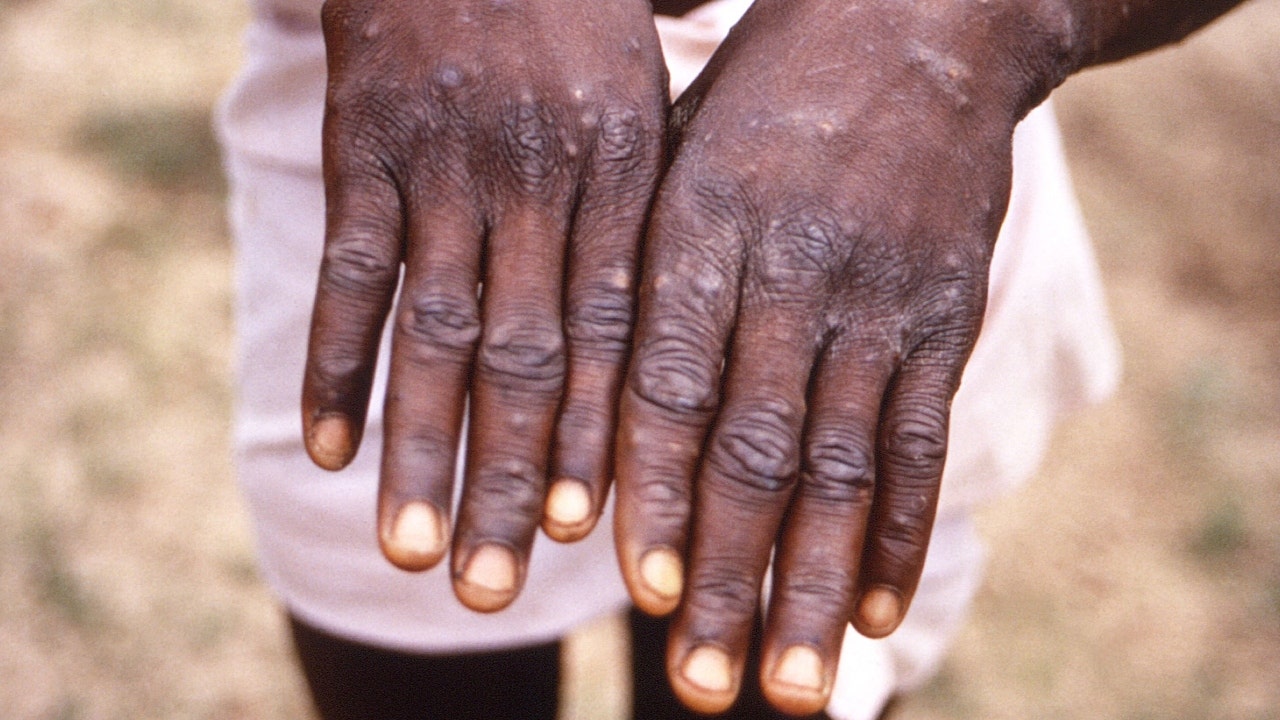Health
Cancer rates rising in young people due to ‘accelerated aging,’ new study finds: ‘Highly troubling’

Accelerated aging — when someone’s biological age is greater than their chronological age — could increase the risk of cancer tumors.
That’s according to new research presented this week at the American Association for Cancer Research (AACR) Annual Meeting in San Diego, California.
“Historically, both cancer and aging have been viewed primarily as concerns for older populations,” Ruiyi Tian, MPH, a graduate student at Washington University School of Medicine in St. Louis and one of the study researchers, told Fox News Digital.
CANCER CASES IN THE SPOTLIGHT AS WHITE HOUSE DECLARES APRIL 2024 ‘CANCER PREVENTION AND EARLY DETECTION MONTH’
“The realization that cancer, and now aging, are becoming significant issues for younger demographics over the past decades was unexpected.”
In the study, diagnoses in patients younger than 55 years old were considered early-onset cancers.
The new study found that those with a higher biological age had a 42% increased risk of early-onset lung cancer, were 22% more prone to early-onset gastrointestinal cancer — and had a 36% higher risk for early-onset uterine cancer. (iStock)
The researchers analyzed data from 148,724 people using the UK Biobank database.
They estimated each person’s biological age using nine biomarkers in the blood — then compared that to their chronological age.
TRAGIC CANCER LOSS INSPIRES NEW YORK TECH ENTREPRENEUR TO ADDRESS ‘URGENT MEDICAL NEED’
Those with a higher biological age had a 42% increased risk of early-onset lung cancer, were 22% more prone to early-onset gastrointestinal cancer, and had a 36% higher risk for early-onset uterine cancer.
The researchers also determined that people born after 1965 were 17% more likely to experience accelerated aging than those born in earlier decades.

Diagnoses in patients younger than 55 years old were considered early-onset cancers. The hope is that the new findings will lead to interventions to slow biological aging as a “new avenue for cancer prevention,” the researchers said. (iStock)
“The principal findings highlight that accelerated aging is increasingly prevalent among successive birth cohorts, potentially serving as a crucial risk factor or mediator for various environmental and lifestyle-related risk factors leading to early-onset cancer,” Tian said in an email to Fox News Digital.
“This discovery challenges us to reconsider the underlying causes of the increasing incidence of early-onset cancers among newer generations,” he added.
“It is vital for recent generations to become more health-conscious and consider the implications of accelerated aging.”
The hope is that these findings will lead to interventions to slow biological aging as a “new avenue for cancer prevention,” the researchers noted, combined with screening efforts tailored to younger individuals.
“It is vital for recent generations to become more health-conscious and consider the implications of accelerated aging,” Tian said.
CANCER AND PRINCESS KATE: IMPORTANT SCREENINGS TO FOCUS ON FOR BEST HEALTH
In future studies, the research team will work to determine the factors that drive accelerated aging and early-onset cancers, which will help with the development of more personalized cancer prevention strategies, according to a press release.
One limitation of the study is that all participants were from the U.K., Tian noted.
“Therefore, our findings may not be directly generalized to populations in other countries or to racial and ethnic minority groups not represented in the cohort.”

Dr. Brett Osborn, a Florida neurologist and longevity expert, often discusses the concept of accelerated aging with his patients, he told Fox News Digital. (Dr. Brett Osborn)
Dr. Brett Osborn, a Florida neurologist and longevity expert, often discusses the concept of accelerated aging with his patients.
“Just because a person is 40 years old chronologically does not mean that they are 40 years old biochemically,” Osborn, who was not involved in the new research, told Fox News Digital.
“In other words, there may be a difference in one’s age – meaning, how long they’ve stood on this earth – and the body’s inner biochemical health, or lack thereof.”
NEW BLOOD TEST SHOWS HIGH ACCURACY FOR COLORECTAL CANCER DETECTION, STUDY FINDS: ‘NOT INTERCHANGEABLE’
In Osborn’s clinic, he measures patients’ biological age to help measure the risk of age-related disease.
“Typically, the older someone is chronologically, the greater the chance of developing diseases such as cancer, diabetes, heart attack and stroke,” he said.

In future studies, the research team (not pictured) said it will work to determine the factors that drive accelerated aging and early-onset cancers — which will help with the development of more personalized cancer prevention strategies. (iStock)
“This is similarly the case if one’s biological age is higher than their calculated biological age — which means they are aging at an accelerated rate relative to their chronological age.”
“Their clock is, in essence, ticking faster.”
“As we reach a given biological age faster, age-related diseases will pop up earlier.”
Obesity plays a big part in accelerated aging, according to Osborn.
“Obesity rates are on the rise, and this is a primary risk factor for aging and age-related diseases,” he said.

Obesity plays a big part in accelerated aging, according to Osborn. “It is a gateway disease to type II diabetes, cancer and Alzheimer’s disease, to name a few,” he told Fox News Digital. (iStock)
“It is a gateway disease to type II diabetes, cancer and Alzheimer’s disease, to name a few.”
Obesity also causes “biochemical abnormalities,” such as insulin resistance and high levels of inflammation in the body, the doctor warned.
CLICK HERE TO SIGN UP FOR OUR HEALTH NEWSLETTER
“As obesity rates rise for a variety of reasons, it should come as no surprise that rates of aging are going to accelerate, along with the rates of diseases such as cancer,” Osborn said.
“More simply put, as we reach a given biological age faster, age-related diseases will pop up earlier.”

The new research was conducted at the Washington University School of Medicine in St. Louis, Missouri. (Washington University)
Regarding the new Washington University study, Osborn called the findings “highly troubling.”
“This parallels the deteriorating health of the younger generations, as is evidenced – in this study – by the heightened cancer risk in the same population,” he told Fox News Digital.
Beyond cancer, Osborn predicted that a spike would also be detected for other age-related diseases.
“Our nation’s health – let alone Britain’s – is imperiled, and unless radical measures are taken, this trend will likely worsen before it gets better,” he warned.
“The younger population will be stricken with lethal diseases at an earlier age.”
For more Health articles, visit www.foxnews.com/health.

Health
Mpox outbreak that is rapidly spreading through Congo may be a new form of the disease

Congo is struggling to contain its biggest mpox outbreak, and scientists say a new form of the disease detected in a mining town might more easily spread among people.
Since January, Congo has reported more than 4,500 suspected mpox cases and nearly 300 deaths, numbers that have roughly tripled from the same period last year, according to the World Health Organization. Congo recently declared the outbreak across the country a health emergency.
An analysis of patients hospitalized between October and January in Kamituga, eastern Congo, suggests recent genetic mutations in mpox are the result of its continued transmission in humans; it’s happening in a town where people have little contact with the wild animals thought to naturally carry the disease.
CDC ISSUES ALERT FOR NEW MPOX (MONKEYPOX) CASES IN CHICAGO
“We’re in a new phase of mpox,” said Dr. Placide Mbala-Kingebeni, the lead researcher of the study, who said it will soon be submitted to a journal for publication. Mbala-Kingebeni heads a lab at Congo’s National Institute of Biomedical Research, which studies the genetics of diseases.
The lesions reported by most patients are milder and on the genitals, Mbala-Kingebeni said, making the disease trickier to diagnose. In previous outbreaks in Africa, lesions were mostly seen on the chest, hands and feet. He also said that the new form seems to have a lower death rate.
A patient shows the rash marks on his hands due to the 1996 to 1997 monkeypox outbreak in the Democratic Republic of the Congo. (CDC/Brian W.J. Mahy/Handout via REUTERS)
In a report on the global mpox situation this week, WHO said the new version of the disease might require a new testing strategy to pick up the mutations.
With experts pointing out that fewer than half of people in Congo with mpox are tested, Mbala-Kingebeni said: “The risk is that unless patients themselves come forward, we will have a silent transmission of the disease and nobody will know.”
Mbala-Kingebeni said most people were infected via sex, with about a third of mpox cases found in sex workers. It was not until the 2022 global emergency of mpox that scientists established the disease was spread via sex, with most cases in gay or bisexual men. In November, WHO confirmed sexual transmission of mpox in Congo for the first time.
There are two kinds, or clades, of mpox, which is related to smallpox and endemic to central and west Africa. Clade 1 is more severe and can kill up to 10% of people infected. Clade 2 triggered the 2022 outbreak; more than 99% of people infected survived.
WHAT IS ALASKAPOX? FIRST FATALITY REPORTED FROM ANIMAL-BORNE VIRUS, LIKELY CONTRACTED FROM STRAY CAT
Mbala-Kingebeni and colleagues said they have identified a new form of clade 1 that may be responsible for more than 240 cases and at least three deaths in Kamituga, a region with a significant transient population traveling elsewhere in Africa and beyond.
Dr. Boghuma Titanji, an infectious diseases expert at Emory University who is not connected to the research, said the new mutations are concerning.
“This suggests the virus is adapting to spread efficiently in humans and could cause some pretty consequential outbreaks,” she said.
Although the mpox epidemics in the West were contained with the help of vaccines and treatments, barely any have been available in Congo. Congo’s minister of health has authorized the use of vaccines in high-risk provinces, said Cris Kacita Osako, coordinator of Congo’s Monkeypox Response Committee. He said officials are in talks with donor countries like Japan to help buy the shots.
“Once a sufficient quantity of vaccines is available … vaccination will be implemented as part of the response,” Kacita Osako said.
Dr. Dimie Ogoina, an mpox expert at Niger Delta University, said the new research is an unsettling reminder of an earlier — but different — outbreak.
CLICK HERE TO SIGN UP FOR OUR HEALTH NEWSLETTER
“The notable spread among sex workers is reminiscent of the early stages of HIV,” he said, explaining that prejudices attached to treating sexually transmitted infections and the reluctance of people with mpox to come forward were worrying.
WHO’s emergencies chief, Dr. Michael Ryan, said last week that despite the ongoing spread of mpox in Africa and elsewhere, “there has not been a single donor dollar invested.”
Health
Cat owners could be at higher risk of schizophrenia, study suggests, but more research needed

Cuddling with a cat or kitten might seem therapeutic, but a new study suggests contact with these animals could have adverse mental health effects down the road.
Research published in Schizophrenia Bulletin found that people who are exposed to cats may have more than double the chances of developing schizophrenia and other similar mental disorders later in life.
Australian researchers from the University of Queensland conducted a systematic review of 17 studies performed in 11 countries between Jan. 1, 1980, and May 30, 2023.
STUDY LINKS CANNABIS ABUSE TO SCHIZOPHRENIA IN YOUNG MEN
The study data was pulled from several databases, including Medline, Embase, CINAHL, Web of Science and other publications.
All the studies focused on participants who owned cats in their first 25 years of life and experienced schizophrenia-related outcomes, according to the researchers.
A new study suggests that being exposed to cats early in life could have adverse mental health effects down the road. (iStock)
Schizophrenia is a mental illness that affects a person’s thoughts, behaviors and feelings, as defined by the National Institute of Mental Health.
Psychotic symptoms can include hallucinations, delusions and thought disorders.
AI-DISCOVERED DRUG SHOWS ‘ENORMOUS POTENTIAL’ TO TREAT SCHIZOPHRENIA: ‘REAL NEED FOR BETTER TREATMENT’
Those with the disorder may also experience cognitive challenges, loss of motivation, withdrawal from social activities, difficulty showing emotions and an overall lack of functioning.
“Based on past studies, there is evidence linking cat ownership and an increased risk of subsequent schizophrenia,” study author Dr. John McGrath, a psychiatrist at Queensland Brain Institute at the University of Queensland, St Lucia, Australia, told Fox News Digital.
“We had an open mind, and we reported the published findings.”

Research published in Schizophrenia Bulletin found that people who own cats may have more than double the chance of developing schizophrenia and other similar mental disorders later in life. (iStock)
Previous research linking cat exposure to schizophrenia risk has focused on Toxoplasma gondii (T. gondii), a parasite that can cause a feline disease called toxoplasmosis.
Separate studies have identified a “modest to large association” between toxoplasmosis and schizophrenia.
CATS AT COLLEGE? ‘HIGHLY EMOTIONAL’ STUDENTS MAY BENEFIT FROM FELINES ON CAMPUS: STUDY
The study did have some limitations, McGrath acknowledged.
“While observational epidemiology cannot prove this link, this topic warrants further, more detailed research,” he said.
“I was disappointed that there were not more highly quality — i.e., more rigorous — studies in our review.”
“Schizophrenia is an incredibly complex disorder, and this study identifies one potential risk factor that needs to be understood in a broader context.”
Schizophrenia is a “poorly understood group of disorders,” McGrath noted.
“We need to invest in more research that looks at potential risk factors. There is much work to be done.”
‘No need to panic’
Dr. Zachary Ginder, a psychological consultant and doctor of clinical psychology at Pine Siskin Consulting, LLC in Riverside, California, was not involved in the study but commented on the findings.

Schizophrenia is a mental illness that affects a person’s thoughts, behaviors and feelings. Psychotic symptoms can include hallucinations, delusions and thought disorders. (iStock)
“It is important to keep a level head in consideration of these findings, and there is no need to panic if you own a cat and have children or are thinking about starting a family,” Ginder told Fox News Digital.
“Schizophrenia is an incredibly complex disorder, and this study identifies one potential risk factor that needs to be understood in a broader context. It would likely be premature to make strong recommendations about cat ownership solely based on these findings.”
CLICK HERE TO SIGN UP FOR OUR HEALTH NEWSLETTER
Although a relationship has been established between early-life cat exposure and schizophrenia, Ginder emphasized that this does not necessarily indicate that exposure causes the disorder.

“A lot more research” is needed to better understand these relationships — “accounting for a myriad of potential confounding factors and exploring underlying biological mechanisms,” said one psychological consultant and doctor of clinical psychology. (iStock)
“There is a lot that we still don’t know, and it is important to highlight that not all people who are exposed to cats or infected with the parasite develop mental health issues, and not all people with schizophrenia have had cat exposure,” he told Fox News Digital.
“While this parasite may play a role, it’s likely part of a complex interplay of genetic and environmental factors.”
Ginder echoed the researchers’ comments that “a lot more research” is needed to better understand these relationships — “accounting for a myriad of potential confounding factors and exploring underlying biological mechanisms.”
“These findings just give us another piece of an incredibly complex puzzle.”
For more Health articles, visit www.foxnews.com/health.
Health
High levels of resistant bacteria found in uncooked meats and raw dog food: ‘Red flag’

High levels of E. coli were found in uncooked meats and raw dog food sold in grocery stores in the U.K., according to research presented last week at the European Society of Clinical Microbiology and Infectious Diseases (ESCMID) Global Congress in Barcelona.
Researchers from the University of Bristol examined 58 samples of raw beef, chicken, pork and lamb sold at grocery stores in the U.K., along with 15 samples of raw dog food sold at “specialty pet stores,” according to a press release.
Eighty-one percent of the meat samples and 87% of the dog food samples were found to contain E. coli (Escherichia coli) that was resistant to antibiotics.
E.COLI BACTERIA DETECTED IN GRAND CANYON NATIONAL PARK’S WATER SUPPLY
The raw chicken had the highest levels of the resistant intestinal bacteria.
“E. coli is an intestinal bacteria that may propagate in cows and chickens used for meat, especially when they are raised in squalor or close together,” Dr. Marc Siegel, clinical professor of medicine at NYU Langone Medical Center and a Fox News medical contributor, told Fox News Digital.
High levels of E. coli were found in uncooked meats and raw dog food sold in grocery stores, according to research presented last week at the European Society of Clinical Microbiology and Infectious Diseases (ESCMID) Global Congress in Barcelona. (iStock)
“Since poultry and meat cows are often fed antibiotics to help them grow and to ward off infections, this helps to breed resistant strains, which emerge amid antibiotic overuse.”
MEAT CONTAMINATED WITH E. COLI COULD CAUSE HALF A MILLION URINARY TRACT INFECTIONS EACH YEAR, STUDY FINDS
Siegel was not involved in the study.
“This study confirms that uncooked meat carries multiple resistant E. coli, commonly including resistance to critically important antibiotics important for human health,” the study authors said in a press release from ESCMID.

“E. coli is an intestinal bacteria that may propagate in cows and chickens used for meat, especially when they are raised in squalor or close together.” (iStock)
If ingested, the bacteria could colonize the intestines and cause resistant infections, according to study author Matthew B. Avison, a professor at the School of Cellular & Molecular Medicine, University of Bristol.
“They can sit in your gut for years without causing sickness, and in some cases the bacteria will cause different types of disease later on, including urinary tract infections and bloodstream infections that can kill,” Avison told Fox News Digital.
“Infections with resistant bacteria are more difficult to treat and so are more likely to get worse.”
RAW DIET FOR DOGS IS TAKING OVER TIKTOK, BUT WHAT DOES YOUR VETERINARIAN THINK OF THE LATEST TREND?
Uncooked meat sold to be eaten by people after cooking is “commonly contaminated” with antibiotic-resistant E. coli, Avison noted.
The study results weren’t surprising, he said, as there have been “numerous reports” of antibiotic-resistant bacteria in uncooked meat and some studies showing this in raw dog food.
“In some cases, the bacteria will cause different types of disease later on, including urinary tract infections and bloodstream infections.”
“People often believe that because raw dog food is sold frozen, the freezing kills the bacteria, but we have shown that it does not,” Avison told Fox News Digital.
“There were just as many samples of chicken-based raw dog food contaminated with resistant E. coli than there were samples of raw chicken meat. If you feed your dog raw meat, therefore, you are likely feeding it antibiotic resistant E. coli.”
These findings explain why researchers previously found a strong link between feeding dogs raw meat and the dogs excreting resistant E. coli in their feces, Avison noted.

“People often believe that because raw dog food is sold frozen, that freezing kills the bacteria on it, but we have shown that it does not,” a researcher told Fox News Digital. (iStock)
Most people are not aware of the risk of these antibiotic-resistant pathogens, the researchers stated in the release.
They emphasized the importance of cooking meat thoroughly before eating, and using “appropriate hygiene practices” while preparing it.
“Cooking the meat properly will kill those bacteria,” Avison advised.
‘GENTLE GIANT’ DOG, AT 250 POUNDS, EATS AN ENTIRE CHICKEN DAILY AS OWNER SPENDS NEARLY $5K A YEAR ON FOOD
“Treat all raw meat as if it were contaminated with antibiotic-resistant bacteria and assume dogs fed raw meat will be excreting resistant bacteria,” he went on.
“Use appropriate hand-washing and general hygiene practices to minimize the risk that you and other people will accidentally ingest these bacteria.”
“If you feed your dog raw meat, you are likely feeding it antibiotic resistant E. coli.”
Dog owners who feed raw meat to their pets should dispose of the animals’ waste hygienically, Avison said.
“Don’t let your dog lick your face or share your bed, and wash your hands after petting it,” he recommended. “These are all common sense practices anyway, but even more important if you raw-feed your dog.”

Researchers emphasized the importance of cooking meat thoroughly before eating, and using “appropriate hygiene practices” while preparing it. (iStock)
“And, of course, treat raw dog food as if it were any raw meat, in terms of hygiene and cleaning practices.”
The study raises a “red flag,” Siegel said, underscoring the importance of making sure that poultry and meat is fully cooked prior to human consumption, and that dog food is also cooked.
CLICK HERE TO SIGN UP FOR OUR HEALTH NEWSLETTER
Andre Delattre, chief operating officer of Public Interest Research Groups (PIRG) in Washington, D.C., said the study “underscores the importance of ending the practice of routine use of antibiotics in animal agriculture.”

“Use appropriate hand-washing and general hygiene practices to minimize the risk that you and other people will accidentally ingest these bacteria,” researchers said. (iStock)
“An inevitable byproduct of antibiotic overuse is resistance to these drugs,” he told Fox News Digital.
“Studies have also shown that meat raised without antibiotics is less likely to be contaminated with resistant bacteria.”
The University of Bristol study was published on a pre-print server and has not yet been peer-reviewed.
Fox News Digital reached out to the U.K. Food Standards Agency (FSA) and the U.S. Food and Drug Administration (FDA) for comment.
For more Health articles, visit www.foxnews.com/health.
-

 News1 week ago
News1 week agoLarry Webb’s deathbed confession solves 2000 cold case murder of Susan and Natasha Carter, 10, whose remains were found hours after he died
-

 World1 week ago
World1 week agoHaiti Prime Minister Ariel Henry resigns, transitional council takes power
-

 News1 week ago
News1 week agoFirst cargo ship passes through new channel since Baltimore bridge collapse
-

 World1 week ago
World1 week agoUS secretly sent long-range ATACMS weapons to Ukraine
-

 World1 week ago
World1 week agoSpanish PM Pedro Sanchez suspends public duties to 'reflect'
-

 News1 week ago
News1 week agoAmerican Airlines passenger alleges discrimination over use of first-class restroom
-

 Movie Reviews1 week ago
Movie Reviews1 week agoHumane (2024) – Movie Review
-

 Education1 week ago
Education1 week agoVideo: Johnson Condemns Pro-Palestinian Protests at Columbia University















